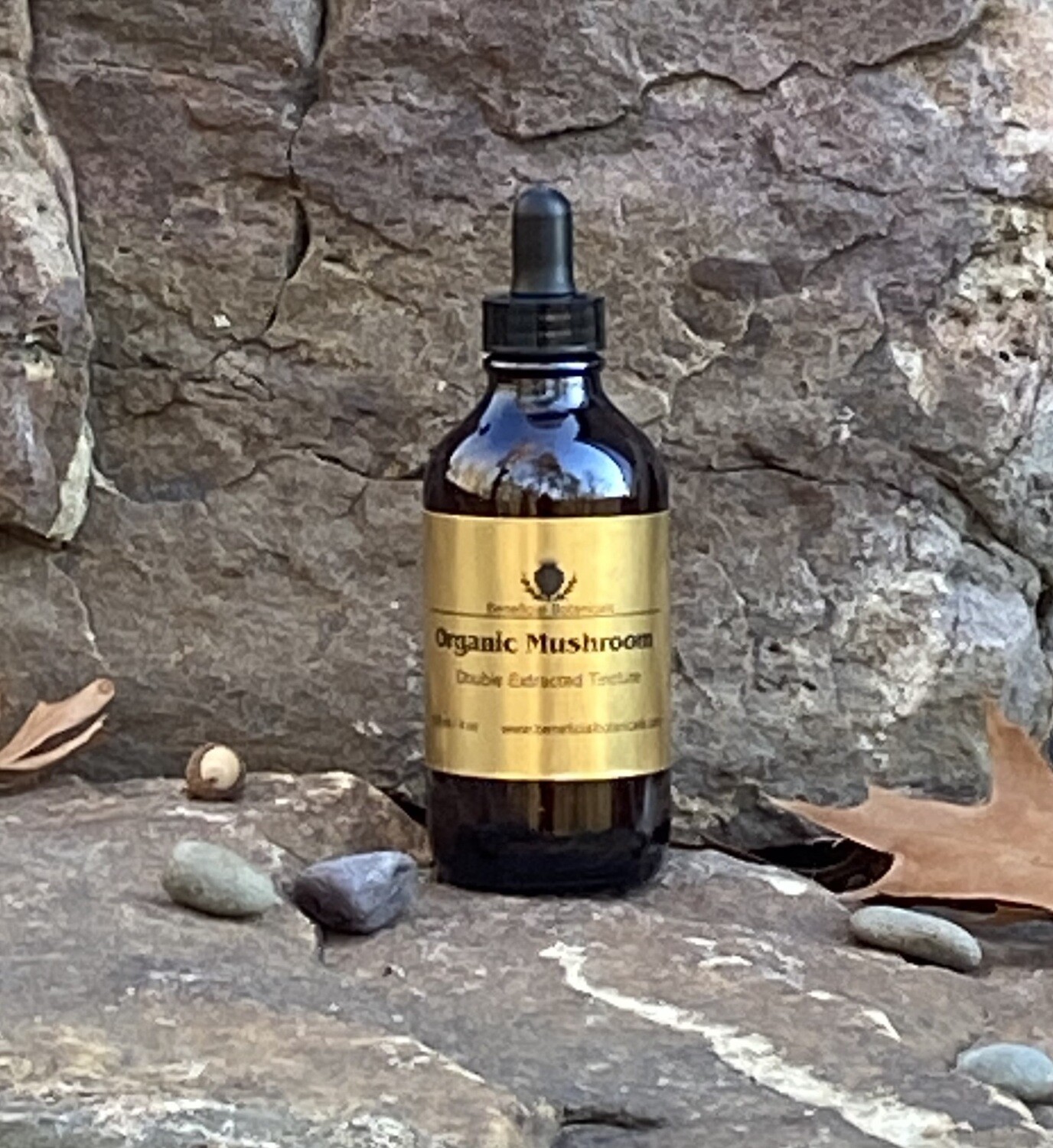Lion's Mane Tincture Double Extraction
Label: Beneficial Botanicals
Botanical Name: Hericium erinaceus
Other Names: Bearded Tooth, Satyr's Beard, Pom Pom Mushroom
Parts Used: fruiting bodies Origin: USA
Organic: yes, cultivated with supplemental hardwood
Menstruum: organic food grade alcohol, spring water
Gluten Free: yes
Alcohol by Volume: 45%
Ratio: 2:3
[tab name="Overview"]
Note: This tincture is made with cultivated Lion's Mane using supplemental hardwood indoors. For wild harvested Lion's Mane tincture, go to the single tinctured product HERE.
Lion's Mane (Hericium erinaceus) is most noted in studies for its two special compounds hericenones and erinacines that stimulate the nerve growth factor (NGF) in the central an peripheral nervous system. This has gained a lot of attention in the field of working with dementia patients and the potential in preventing early onset dementia. Studies have noted its affect on the hippocampus, primarily known for being the part of the brain where memory is stored. This area of the brain also processes emotional responses.
[tab name="Use / Dosage"]
READ ABOUT INDICATIONS HERE
https://beneficialbotanicals.com/lions-mane-information/
Known Dosage (for Adults)
Stimulate Nerve Cell Growth : 1 teaspoon twice a day in a small amount of water.
Anxiety : 1 teaspoon twice a day in a small amount of water
Lyme Disease : Stephen Buhner recommends 1/2 tsp. 3 x daily taken in a small amount of water.
[tab name="Precautions"]
Generally considered safe, however if you are allergic to mushrooms or derivatives of fungi, do not take this tincture.
According to Dr. Andrew Weil, MD, Lion's Mane mushroom is a nontoxic medicinal (and culinary) and completely safe for women who are breastfeeding.
As with all herbal medicine, generally known to be blood thinning, discontinue 2 weeks before a scheduled surgery.
[tab name="References"]
Chong, P.S., Poon, C.H., Roy, J. et al. Neurogenesis-dependent antidepressant-like activity of Hericium erinaceus in an animal model of depression. Chin Med 16, 132 (2021). https://doi.org/10.1186/s13020-021-00546-8
Ryu S, Kim HG, Kim JY, Kim SY, Cho KO. Hericium erinaceus Extract Reduces Anxiety and Depressive Behaviors by Promoting Hippocampal Neurogenesis in the Adult Mouse Brain. J Med Food. 2018 Feb;21(2):174-180. doi: 10.1089/jmf.2017.4006. Epub 2017 Nov 1. PMID: 29091526.
Neurotrophic properties of the Lion's mane medicinal mushroom, Hericium erinaceus (Higher Basidiomycetes) from Malaysia. Lai PL, Naidu M, Sabaratnam V, Wong KH, David RP, Kuppusamy UR, Abdullah N, Malek SN. Int J Med Mushrooms. 2013;15(6):539-54.
High molecular weight of polysaccharides from Hericium erinaceus against amyloid beta-induced neurotoxicity. Cheng JH, Tsai CL, Lien YY, Lee MS4, Sheu SC. BMC Complement Altern Med. 2016 Jun 7;16:170. doi: 10.1186/s12906-016-1154-5.
Improving effects of the mushroom Yamabushitake (Hericium erinaceus) on mild cognitive impairment: a double blinded, placebo controlled clinical trial. Mori, K., Inatomi, S., Ouchi, K. Azumi, Y and Tuchida T. 2009. Phytother Res. 23:367-372.
Hericenone C, D and E, stimulators of nerve growth factor (NGF) synthesis from the mushroom Hericium erinaceum. Kawagishi, H., Ando, M., Sakamoto, H., Yoshida S., Ojima, F., Ishiguro, Y., Ukai, N., Fukukawa, S. 1991. Tetrahedron Lett 32, 4561-4564.
Hericenones and erinacines: stimulators of nerve growth factor (NGF) biosynthesis in Hericium erinaceus. Ma, Bing-Ji , Jin-Wen Shen, Hai-You Yu, Yuan Ruan, Ting-Ting Wu & Xu Zhao, 2010. Mycology: An International Journal on Fungal Biology. 1(2): 92-98
[endtab]
These statements have not been evaluated by the Food and Drug Administration. The information provided here is intended to supplement, not substitute for, the expertise and judgment of your physician, pharmacist or other healthcare provider and should not be construed to indicate that the use of this herbal product is safe, appropriate, or effective for you. Consult your healthcare provider before taking this herbal product.

